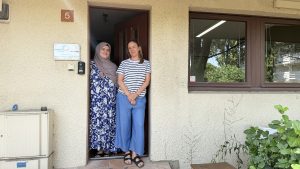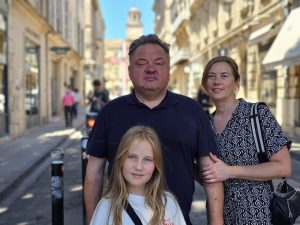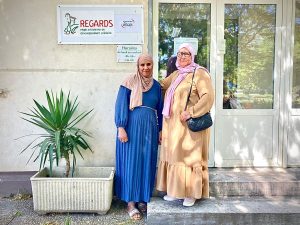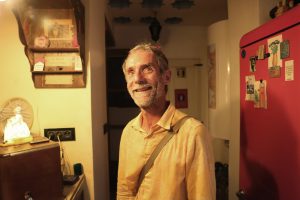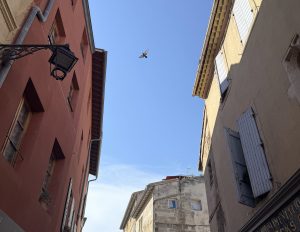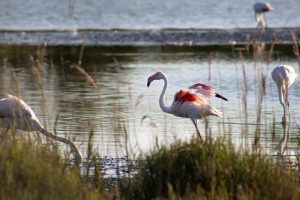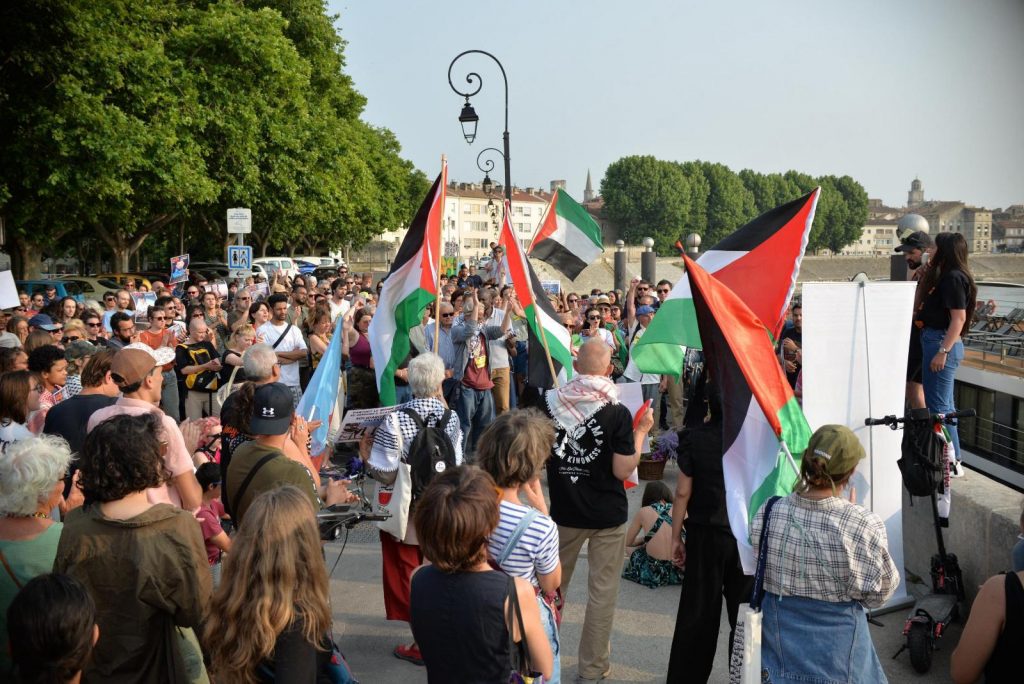
Protesters, some waving Palestinian flags and holding up signs, congregate by the Rhône River in a spontaneous pro-Palestinian gathering on June 8. Photo courtesy of Eric Besatti.
Text by Morgan Dunn and Danny Pottharst
Photos by Morgan Dunn
Plastered onto building facades, displayed in cafe windows and taped onto chairs and poles throughout Arles are posters and stickers with bold block lettering and the slogans of a revolution. “Ceasefire!” “From the river to the sea / Palestine will be free,” “Palestine Vivra / Boycott Israël,” they read.
This is the messaging of Arles pour la Palestine (Arles for Palestine), an Arles-based, pro-Palestinian collective organized in 2023.
The collective is made up of Arlesians who support the global “Free Palestine” movement, and it aims to spread awareness about Israel’s ongoing genocide of Palestinians in Gaza by organizing local gatherings and protests.
Arles residents Sydney Firsching and Jecilla Regad are members of the collective.
“Our main goal is to not be passive about the situation that is happening in Palestine,” Regad said.
The collective got off the ground by projecting Palestinian films to the Arlesian community. These showings helped it gain traction, Firsching said, and even influenced her to join the group a few months later in early 2024.
Regardless of how members become involved in it, the collective is steadfastly non-hierarchical. There is no president or authority figure within the group, Firsching said, and it has 30 official members, 12 of whom are consistently active. Another 300 or so people are regularly updated on the collective’s actions through WhatsApp.
Those involved in the collective are simply people who don’t accept the atrocities in Gaza and don’t think a hierarchy is necessary, Regad said.
Firsching, who is from the United States, said the U.S.’ longstanding alliance with Israel makes her feel connected to the pro-Palestinian cause—but she believes that it’s a truly global one.
“I think every single person on this planet has a personal tie with what’s happening in Gaza,” Firsching said.
Regad, who is French, is passionate about the cause for similar reasons.
“Without even knowing the history of this conflict, just as a human being, seeing these images [from Gaza] and how horrible they are [makes] you immediately feel called to act,” Regad said. “And [it is also] because France gave unconditional support to the creation of the state of Israel.”
Since Israel was formally recognized as a state in 1948, it has maintained a close economic relationship with France. However, in a May 19 joint statement, France, the United Kingdom and Canada said that they “strongly oppose the expansion of Israel’s military operations in Gaza” and that “the level of human suffering in Gaza is intolerable.”
The Ministère de l’Europe et des Affaires étrangères (Ministry of Europe and Foreign Affairs) states that France supports the two-state solution for Israel and Palestine, and French President Emmanuel Macron has called for broader de-escalation in the Middle East.
For Regad and Firsching, it’s difficult to look past France’s financial support of Israel.
They also believe that it is important to broadcast the history of the Israel-Palestine conflict so that people are aware of the long-standing nature of the conflict.
“A lot of people will come to us and say, ‘Wow, I had no idea what was actually happening and what’s been happening for decades,’” Firsching said.
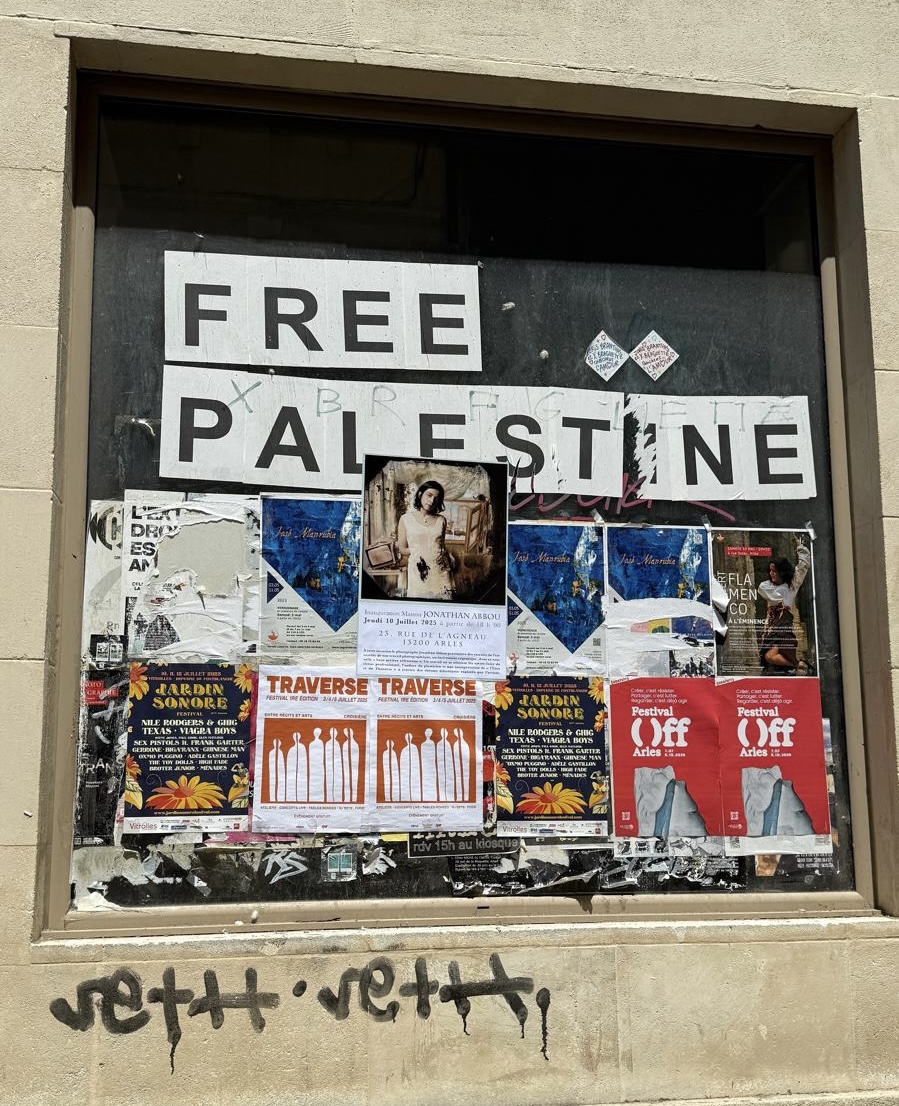
Since its inception, the collective has continued to show screenings of Palestinian films, but it now also holds conferences and gatherings, organizes protests and collaborates with connected pro-Palestinian groups.
In May 2024, the collective attended an event organized by La France insoumise (France Unbowed), which Regad and Firsching see as the only political party in France that openly supports a free Palestine. The event featured Rima Hassan, a French Palestinian member of the European Parliament.
“The reason we accepted [to be a part of the event] was because they weren’t requiring us to say any specific discourse,” Firsching said. “We were completely free in our expression of what we could say.”
This is of particular importance to the collective as it is not affiliated with a political party. It values the freedom to express its own opinions and critique others, Firsching said.
To this end, the collective makes a point to display images of the Palestinian flag throughout the city, especially because of the denial of Palestine’s existence by some, Firsching and Regad said.
“The fact that people are making the Palestinian flag visible everywhere, that we talk about Palestine, is a form of defeat for Israel, the colonial state,” Regad said.
Arlesians are taking notice. One of the collective’s recent events with the Freedom Flotilla saw a turnout of nearly 400 people, despite being a “spontaneous gathering,” Firsching said.
As that tally indicates, and as explained by Firsching and Regad, mobilization has not been much of a challenge for the collective in the small community of Arles. The two pointed to boycotting as a particularly effective form of mobilization because of its ease of participation.
“We also educate people about boycotting because one thing that every single person can do to support Palestinians is boycotting Israeli products,” Firsching said.
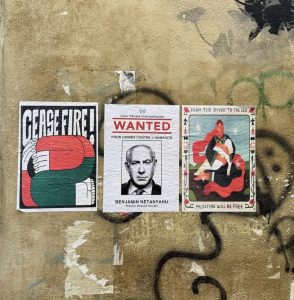
At the same time, the collective also recognizes that certain forms of boycotting are not accessible forms of protest for all. For example, people in low-income situations often purchase everyday items at companies that offer cheaper products but also invest in Israel. With this in mind, Firsching and Regad emphasized the collective’s focus on boycotting larger corporations invested in Israel to involve a broader constituency.
One such corporation, Coca-Cola, has been a recent focus of the collective’s boycott efforts. The group has promoted a Palestinian-made alternative to Coca-Cola in Arles by distributing an order form for the product to local restaurants.
The collective does not make money from this effort but rather hopes to increase access to Palestinian-made products through it and similar initiatives, Firsching said.
Arles pour La Palestine is funded entirely by donations, out-of-pocket member contributions and the selling of Palestinian-made products, Firsching said.
The collective has struggled to find spaces to host its events. Firsching and Regad explained that this is not because people don’t support the movement, but because they fear the potential repercussions of a connection to the collective.
L’Angerie, located in La Roquette, often provides the collective with space for its small group meetings.
Looking ahead, the collective’s next gathering is scheduled for July 16 to hear Georges Ibrahim Abdallah, the oldest political prisoner in Europe, speak.
Firsching hopes that the collective’s events and initiatives help people recognize that the genocide affects more than just the Palestinians in Gaza.
“It’s not just for my freedom, our freedom,” Regad said. “We fight for all people.”
